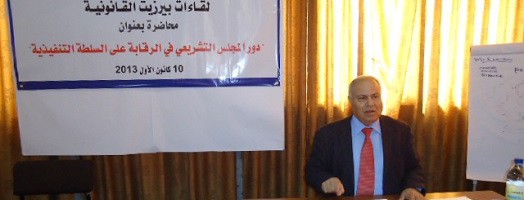The Oversight Role of the PLC over the Executive Authority
the presentation was made by Dr. Fa’hi al Wahidi, lecturer at the Gaza-based Al Azhar University.The legal encounter brought together members of the legal community and representatives of civil society organisations.
In her opening statement, Ms. Lina at Tounisi, Coordinator of the IoL Gaza Office, welcomed the speaker and audience and made a briefing note about the IoL Legal Encounters programme. Designed to promote the rule of law principle, legal encounters raise awareness of selected legal issues and concerns.
Dr. Wahidi explained that real parliamentary oversight is a significant guarantee against the Executive encroachment on other powers, precluding violation of the law. The Palestinian Legislative Council (PLC) possesses a number of oversight tools, enabling control of Executive functions. These include inquiries, impeachment, reproof, and vote of no confidence. The PLC is also authorised to approve the annual public budget and endorse agreements. In this context, Dr. Wahidi explained the extent to which the PLC elected in 1996 put these tools into effect.
In light of the Amended Basic Law of 2003, Dr. Wahidi highlighted key oversight tools provided by the PLC Standing Orders. Contradictory provisions of the Basic Law and PLC Standing Orders have resulted in an anomalous working relationship between the Legislative and Executive powers. In this vein, the Executive does not pay due respect to the PLC Standing Orders.
Dr. Wahidi reviewed problems the PLC faced when it was established, but which have also continued to impair respective parliamentary functions. PLC members are not adequately experienced with common, applicable parliamentary norms and traditions. Parliamentary blocs are ineffective due to a single party control of the Legislature and Executive powers in the West Bank and Gaza Strip. Clear constitutional norms, which govern the working relationship between the three powers, are not in place. In addition to the geographical split between the West Bank and Gaza, legal cultures are different because of discrepant legal and constitutional systems, which were in force in each area. PLC sessions are not held on a regular basis. Many PLC members do not pay attention to or follow up with the law-making process. With an expired term, a nationwide debate has questioned the legitimate status of the PLC.
Dr. Wahidi highlighted challenges to the PLC’s function and role of oversight of the Executive, presenting opportunities to overcome these predicaments. Challenges include the special nature of the PLC, working relationship between the PLC and Palestinian National Council, and nexus between the Palestinian National Authority (PNA) and Palestine Liberation Organisation (PLO). Exercising oversight of the Executive should take place on three levels: (i) parliamentary oversight; (ii) judicial oversight, including a judicial power to revoke Executive decisions that violate the law; and (iii) Executive self-control.
Finally, Dr. Wahidi explained that the internal Palestinian political divide has resulted in duplicate executive and judicial bodies as well as in an unconsolidated legal framework. Three agencies now represent the Palestinian people: the PLO; the Ramallah-based PNA, which has been recognised as a non-member state of the United Nations; and the de facto government in Gaza.
In the ensuing discussion, the audience made several interventions and recommendations. Most importantly, oversight is an important and fundamental democratic component of liberal societies. The parliamentary system is grounded on cooperation and balance. Oversight should be reciprocated between legislative and executive bodies, positively impacting joint working relationships and ensuring a smooth progress of the constitutional life.
The legal encounter was organised in partnership with the Konrad Adenauer Stiftung.











